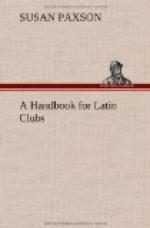Back to the murky realms below.
“Be mine the cruel task!” he said,
And, at a word, a bolt he sped,
Which, falling in a desert place,
Left all unhurt the human race!
Grown bold and bolder, wicked men
Wax worse and worse, until again
The stench to high Olympus came,
And all the gods began to blame
The monarch’s weak indulgence,—they
Would crush the knaves without delay!
At this, the ruler of the air
Proceeds a tempest to prepare,
Which, dark and dire, he swiftly hurled
In raging fury on the world!
But not where human beings dwell
(So Jove provides) the tempest fell.
And still the sin and wickedness
Of men grew more, instead of less:
Whereat the gods declare, at length,
For thunder bolts of greater strength
Which Vulcan soon, at Jove’s command,
Wrought in his forge with dexterous hand.
Now from the smithy’s glowing flame
Two different sorts of weapons came:
To hit the mark was one designed;
As sure to miss, the other kind.
The second sort the Thunderer threw,
Which not a human being slew;
But roaring loudly, hurtled wide
On forest-top and mountain-side!
MORAL
What means this ancient tale? That Jove
In wrath still felt a parent’s love:
Whatever crimes he may have done,
The father yearns to spare the son.
—John G. Saxe
THE PRAYER OF SOCRATES
Socrates
Ere we leave this friendly sky,
And cool Ilyssus flowing by,
Change the shrill cicala’s song
For the clamor of the throng,
Let us make a parting prayer
To the gods of earth and air.
Phaedrus
My wish, O Friend, accords with thine,
Say thou the prayer, it shall be mine.
Socrates
This then, I ask, O thou beloved Pan,
And all ye other gods: Help, as ye can,
That I may prosper in the inner man;
Grant ye that what I have or yet may win
Of those the outer things may be akin
And constantly at peace within;
May I regard the wise the rich, and care
Myself for no more gold, as my earth-share,
Than he who’s of an honest heart can bear.
—John H. Finley
BY THE ROMAN ROAD
“Poetry and paganism do not mix very well nowadays. The Hellenism of our versifiers is, as a rule, not Greek; it is derived partly from Swinburne and partly from Pater. But now and then there comes a poet who has real appreciation of the beauty of classic days; who can express sincerely and vividly the haunting charm of Greek or Roman culture. Such an one is the anonymous writer of these lines, which appeared in the London Punch.”




